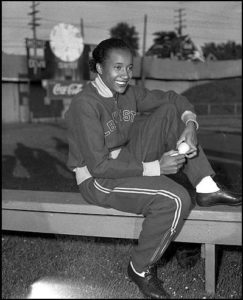Doctor Curmudgeon® Alice Coachman – She Did It!
 By Diane Batshaw Eisman, M.D. FAAP Doctor Eisman, is in Family Practice in Aventura, Florida with her partner, Dr. Eugene Eisman, an internist/cardiologist
By Diane Batshaw Eisman, M.D. FAAP Doctor Eisman, is in Family Practice in Aventura, Florida with her partner, Dr. Eugene Eisman, an internist/cardiologist
My thoughts linger on the Olympic Games. Not the Olympics of today.
The event is the Summer Olympics of 1948.
The place is London.
Dark clouds hid the sun. It was not a beautiful day. Rain was falling. The women’s track and field event was ending.
For the American women, the 1948 Olympics had not been a victorious event. No gold medal had been awarded for any of their competitions.
Then along came Alice Coachman.
She conquered the high jump with an unheard-of leap of 5 feet, 6 1/8 inches.
An American woman had just soared to this previously unprecedented height.
A Black American woman.
A Black American athlete who was now the first Black woman to win an Olympic Gold medal.
Where had this extraordinary champion come from?
Alice Coachman was born on November 9 in 1923 in Albany, Georgia.
Because of the color of her skin, she faced innumerable barriers. No training facilities were open to her. She was not allowed to gain the experience of participating in organized sports.
The indomitable Alice did whatever she could.
She gained strength and endurance by running shoeless along dirt roads. There were no trainers to guide a young Black woman, and so she practiced jumping with whatever was at hand.
It was not an easy path for Alice.
At the time of the Summer Olympics and plagued with back troubles, Alice was considered too old to be a champion athlete. She was an ancient twenty five.
A humble woman, she could not believe that she was an Olympic gold medalist.
In an interview with NPR, she said “I saw it on the board, ‘A. Coachman, U.S.A., Number One,’ I went on, stood up there, and they started playing the national anthem. It was wonderful to hear.”
At the podium, King George, VI, presented the gold medal to her. And she was welcomed aboard the British Royal Yacht.
She was invited to the White House by President Harry S. Truman and personally congratulated by him.
The ugliness of racism and segregation persisted in her own hometown. Nothing had really changed. There was a celebration at the Albany Municipal Auditorium and segregation was in full force with whites on one side and blacks seated separately on the other side. The Albany mayor refused to sit on the same stage with her, refused to shake the athlete’s hand and she was forced to leave through a side door of the auditorium in the city she had honored with her accomplishment.
She told The Telegraph newspaper, “We had segregation but it wasn’t any problem for me because I had won. That was up to them, whether they accepted it or not.”
Alice went on to graduate from Albany State College, being awarded a B.S. in Home Economics with a minor in science.
She became an instructor in track and field and a teacher.
Retired from competition, Coca Cola chose her to be a spokesperson. She continued to contribute to sports by establishing the Alice Coachman Track and Field Foundation, with a mission to help retired Olympic veterans and provide support to young athletes.
Alice Coachman has been called one of the one hundred greatest Olympians.
It was in a 1996 New York Times interview that she said, “I made a difference among the Blacks, being one of the leaders. If I had gone to the games and failed, there wouldn’t be anyone to follow in my footsteps. It encouraged the rest of the women to work harder and fight harder.”
Dr. Curmudgeon suggests “Bitter Medicine”, Dr. Eugene Eisman’s story of his experiences–from the humorous to the intense—as a young army doctor serving in the Vietnam War.
Bitter Medicine by Eugene H. Eisman, M.D. –on Amazon
Doctor Curmudgeon® is Diane Batshaw Eisman, M.D., a physician-satirist. This column originally appeared on SERMO, the leading global social network for doctors.
SERMO www.sermo.com “talk real world medicine”

